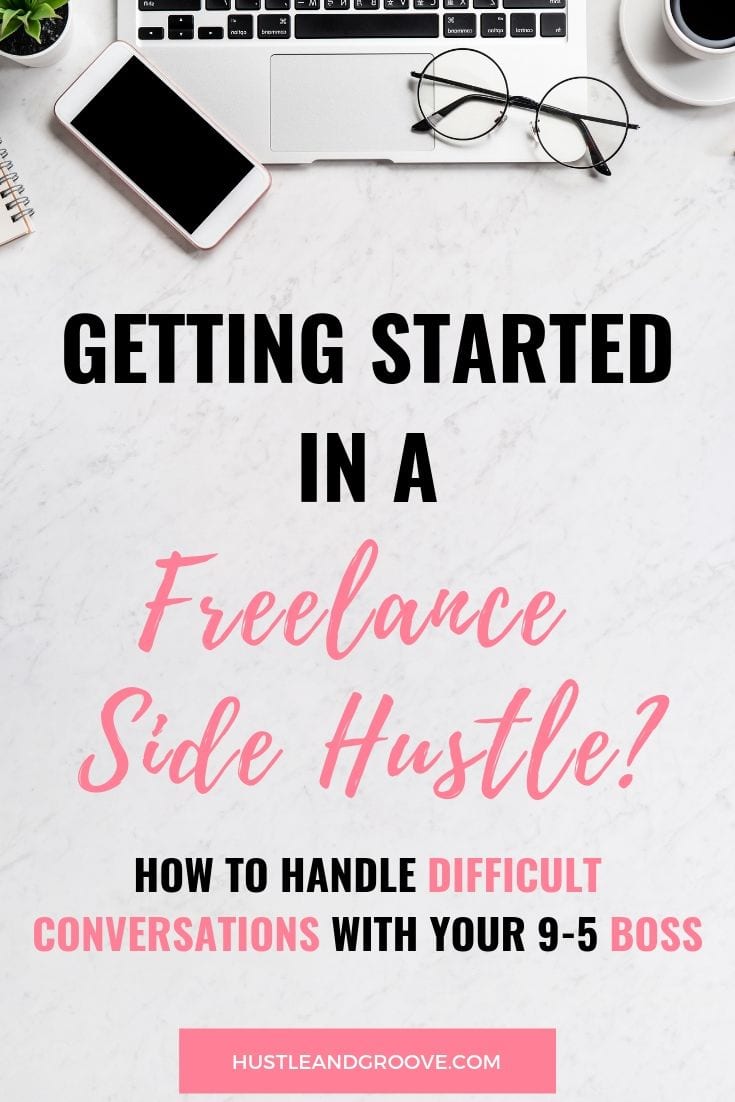If you’re still working a day job, there will come a time where you’ve got to have at least one or more difficult conversations with your boss…
But what if you’re faced with this happening before you’re ready? What if, gasp, your boss finds out about your side hustle BEFORE you’re ready for them to know and demands an explanation?
There are a number of scenarios where difficult conversations with your boss about your side hustle might arise… and all of them can be avoided by doing one simple thing:
Telling your boss about your side hustle before you even start it. Being upfront and letting them know that you’re doing something else outside of your job is always the best way to go…
But what if that’s just not possible? What if — due to the terms of your contract — you’re not allowed to have a side hustle, but you’re breaking the rules anyway?
Yeah, I feel ya. I fell into the second camp when I was starting my side hustle. I didn’t care that I wasn’t meant to be doing it, I was sick and tired of being told what to do and when without it creeping into my personal life!
So I accepted the potential risks and ploughed ahead.
Now, obviously, I don’t recommend this. It is completely your decision to defy the terms of your contract if they are set out this way, or if you simply just don’t want your boss up in yo’ business! Totally understand.
Related: Need some personal, one-one-one help? Jump on a call with me and let’s chat it out!
But how you manage those difficult conversations? That’s what we’re gonna chat about here, because there are definitely right and wrong ways to handle this kind of thing.
And you don’t wanna burn any bridges when you’re just getting started, particularly if you’re not even certain that your side hustle has any legs yet. You don’t wanna shoot yourself in the foot just for being over work, right?
Listen to this post instead!
[soundcloud url=”https://api.soundcloud.com/tracks/267767669″ params=”auto_play=false&hide_related=false&show_comments=true&show_user=true&show_reposts=false&visual=true” width=”100%” height=”125″ iframe=”true” /]
Difficult Conversations With Your Boss: 5 Ways to Handle Yourself
Before we go any further, there are some ways that you can prepare yourself mentally. Even if the conversation has just been broached with you (in most instances, your boss will book a time with you to chat, they won’t just dive straight in) and you’ve got a meeting time in place, there are still a few things you can do:
[bullet_block style=”size-16″ small_icon=”11.png” width=”” alignment=”center”]
- Change your mindset. Don’t view it as a difficult conversation, view it as an opportunity to have an open discussion.
- Take 5-6 deep breaths, especially just before you walk into the meeting. This will help centre you.
- Write down a couple of the main points you want to cover, particularly if you know what the conversation is about, but don’t script it too much.
[/bullet_block]
Now that you’re somewhat prepared, here’s how you should handle yourself during the conversation. This could be a conversation that you’ve initiated or that they’ve initiated — the strategies are the same.
#1: Avoid making small talk
It’s best to dive into the conversation straight away. There is no point delaying what you have to say or what your boss has to say. Small talk will only make you more anxious and make you feel worse.
If you’re boss starts making small talk, tell them you’d like to cut straight to the chase, to get straight to the point. Obviously don’t be rude about it, but be polite, keep your cool and keep breathing deeply!
If you’re looking to instigate the conversation yourself, but aren’t sure how to even broach the topic, Judy Ringer provides some great opening lines, you can see a few below (which I’ve modified to suit your needs):
[bullet_block style=”size-16″ small_icon=”12.png” width=”” alignment=”center”]
- I have something I’d like to discuss with you that I think will help me work more effectively.
- I’d like to talk about ______________ with you, can we arrange a time to discuss?
- Do you have a few minutes to talk?
[/bullet_block]
#2: Be clear, direct and unemotional
This is easier said than done, I know. Having difficult conversations with your boss is never easy, but it’s even harder if you become emotional during the discussion.
Keep telling yourself that this is just a conversation, it doesn’t have to be hard. This is your boss, another human being. Keep to the facts and be direct and upfront.
If the conversation has been instigated by you, then lay everything out on the table. Be open and as helpful as possible, particularly if you’re resigning. You want to walk out of your workplace with your head held high, not being escorted by security!
If the conversation has been instigated by your boss, then answer their questions without emotion, provide the facts and be as clear and direct as you can (or are prepared to share with them).
Remember, you don’t have to provide them with all the details.
Here’s a few examples of potential questions your boss might ask you during the chat:
[bullet_block style=”size-16″ small_icon=”16.png” width=”” alignment=”center”]
- I understand that you’ve started a side business outside of work hours. What is the business about?
- What websites are you using to find work?
- How much are you charging for what you’re doing?
- How many hours per week are you dedicating to your side business?
- How long do you plan to run this side business?
[/bullet_block]
Now, depending on the terms of your contract, you could be in violation simply by having the side hustle, but if your contract doesn’t stipulate this, then it’s really up to you what questions you answer.
Personally, when I had this conversation with my boss, I gave her some very vague answers, but enough information for her to be able to report back to her boss that she’d done her job.
Some of my responses looked like this:
“Yes I have started a side business. I’m offering freelance writing services.”
“I use a variety of websites to connect with potential clients.”
“I don’t use a set rate, I price based on a project outline, so that’s hard to answer. Approximately what I’m paid here an hour is a good base to start.”
“I average about 5-10 hours per week working on my side hustle.”
“I plan to run my side business as long as it remains fun and profitable.”
Feel free to tweak these for your own use.
#3: Maintain eye contact
You have nothing to hide, so there’s no reason for you to look at the ground while you’re chatting to your boss. Be confident in what you’re saying and maintain eye contact… but don’t just stare. Be normal!
When you’re talking, it’s important that you look at your boss directly, the more times you look away or look at the ground, the more that you’re boss is going to feel like you’re being dishonest or trying to hide something.
Remember, how successful this conversation goes largely rests on your shoulders. Give yourself a quick pep talk if you need to before jumping into the meeting. This is your life after all, the company doesn’t own you, it is still your choice to show up to work every day and it’s your choice to also take steps to improve your life… of course, you don’t have to say that to your boss, but saying it to yourself might help you get through having difficult conversations.
#4: Sit up straight
Maintain a good posture throughout the meeting. Don’t slouch and don’t cross your arms. Keep an open body position and sit straight. Not only will this make you feel more confident, it will also make your boss feel like you’re also confident in what you’re saying.
You want to keep this meeting as short as possible and by maintaining eye contact and being confident, you portray this to your boss, reducing the need for them to answer more prying questions.
#5: Be honest
Be as honest as you can in your answers. If you have a good relationship with your boss, this is relatively easy. If you don’t have a great relationship with your boss, then be as honest as you’re prepared to be with them.
It really comes down to reading the situation and taking your time in answer the questions being posed to you. Every situation will be different, but if you can keep your cool, you will come out feeling a lot better.
If things head south, then you have to be prepared to deal with the consequences. And this is something you should really think about BEFORE you start your side hustle, particularly if you know that at some point, your boss is going to find out.
Honestly, in most cases you’ll be fine, but it always pays to be prepared, right? I had a really good working relationship with my boss, and I also knew she wasn’t internet savvy, so I knew there was no way of her finding out what I was getting up to unless she started jumping on sites like Upwork and found me there!
Bottom line: prepare for having difficult conversations with your boss or simply be upfront and tell them what you’re up to. They are human, they understand the need to live a life you want. And if we’re being really honest, I bet they’ll be a little jealous of you going after what you want!
Have you had a difficult conversation with your boss? Let me know how it went in the comments below!



